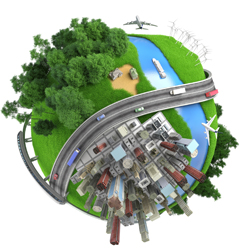Supporting research on climate-friendly transport
The EU's transport policy has long envisioned a single, efficient pan-European transport network based on liberalisation of the market and harmonisation of standards. With this, however, comes the challenge of making the transport system more sustainable and reducing the massive amounts of carbon emissions that it produces. The EU-funded project 'Supporting research on climate-friendly transport' (REACT) addressed climate-friendly and low-carbon transport objectives in line with EU directives. Seeking to create a common transport strategy among EU states with sustainability in mind, the project team worked on building synergy in research transport and streamlining collaboration. This involved identifying national and regional funding projects on climate-friendly transport and outlining a strategic vision on the topic for the long term. To achieve its aims, the project built a database of around 500 transport stakeholders, involving them in consultations and providing valuable information on climate-friendly transport. It prepared a strategic research agenda on the topic, creating databases for EU-funded research projects and funding initiatives. Links to the project's resources and database can be found on the project website(opens in new window). The research agenda paves the way for achieving a climate-friendly vision over the next 20 years, identifying targets to be met and fostering innovative initiatives. It tackles aeronautics, airline companies, airports, railways, road mobility and waterborne travel, focusing on reducing emissions and on implementing green practices. Another key project achievement was to create guidelines for funding schemes regarding low-carbon transport research, enhancing the impact of research outcomes from EU-funded projects. Equally important, the participation of experts in the project has helped articulate a set of indicators for carbon impact of the transport sector. REACT also conducted two expert workshops and a conference that received more than 75 papers. The papers enabled researchers to disseminate their research findings to peers and highlight the importance of research-funded activities to promote scientific knowledge. Overall, the REACT project helped support green transport research and brought key stakeholders together. It focused on three main axes, namely bringing benefits for society, boosting competitiveness for the economy, and fostering cutting-edge knowledge and excellence. Wide dissemination of the project's results to concerned audiences worldwide, backed by a successful project conference, has contributed to furthering this pivotal topic significantly.



